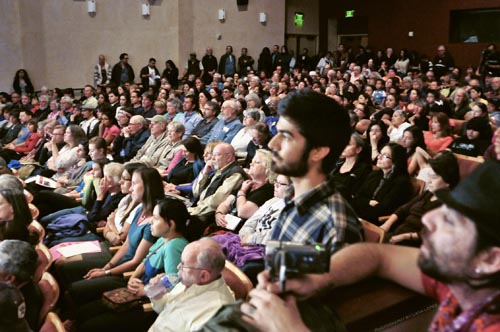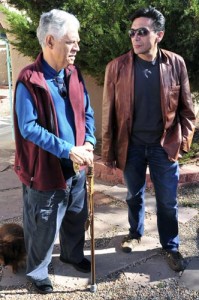Book Smugglers in the United States
by Merritt Wuchina / May 21, 2012 / 9 Comments

Over 400 audience members wait for the caravanistas to arrive at the National Hispanic Cultural Center for the Banned Book Bash in Albuquerque, New Mexico
March 12 to March 16, 2012: Houston, San Antonio, El Paso, Mesilla and Albuquerque.
At ten in the morning on March 12, the Librotraficante Caravan started with a despedida (a going away party) in Houston, Texas. A crowd of approximately one hundred people gathered outside of Casa Ramirez, a Mexican shop owned by Mariano Ramirez, who once had marched with Cesar Chavez. Rally goers held signs made by children’s book author Marie Elena Cortez that read: “Arizona legislators tried to erase our history, so we are making more!” ; “All Art is Breaking Loose” ; “Only Art Can Save Us” ; “We have a dream…free books for everyone!”
In a tent in front of the shop, Tony Diaz stood with microphone in hand, behind a table covered with pan dulce, fruit, and Mexican candy.
In the crowd stood community icons like immigration rights activist Maria Jimenez and Pancho Claus, a man dressed in a red zoot suit who hands out toys to Latino kids at Christmas. A news anchor with Fox 26 News interviewed the organizers and they gained a spot on TV. As the tour bus pulled away the crowd cheered and ran behind, wishing their thirty-five librotraficantes a buen viaje.
- Librotraficante Caravan: Carmen Tafolla
- Banned writer Carmen Tafolla speaks at the Alamo in support of the Librotraficante caravan, Chicano history and literature.
Following the Houston send off, the Librotraficante Caravan arrived in San Antonio for a rally and reading in front of the Alamo. An audience of tourists, students, followers with posters, politicians, writers, newscasters, and even Mohawk-clad punk rockers, stood around watching poets like Lorna Dee Cervantes speak about their experience. Bryce Milligan of Wings Press was there with a 200-book donation of Curanderas, whose publication date had been pushed up specifically so the books could join the caravan. Carmen Tafolla was also in the audience. Although she had helped Diaz organize an event at the Guadalupe Cultural Center, scheduled later that evening, she did not plan on speaking. Tafolla had developed a respiratory infection and her doctor recommended total silence so she wouldn’t lose her voice.
“We have the banned authors among us…Contraband people, like Carmen Tafolla,” Diaz announced as he held up Tafolla’s banned book Curandera, and handed her the mike.
In that moment Tafolla had no idea what she would say, but she knew she had to speak up.
“Un abrazo a todos aquí, because you are doing the work of democracy,” she said. The crowd cheered. “You are doing the work that this country was supposedly built on!”
Some of the Alamo’s tourists came by to listen to the speakers, but the history they heard was not from a typical US history textbook. It was the history presented in Occupied America, Rethinking Columbus, and other Chicano books. The crowd listened to how the Alamo, the “Shrine of Texas Freedom,” was once part of Mexico, and how Mexican-Americans, like Tafolla, had not illegally immigrated to the US at all – actually their ancestors were native to the land before it was even considered Texas or Mexico.

Tony Diaz (El Librotraficante) and Rudolfo Anaya (author of 'Bless Me Ultima') the father of Chicano literature. Anaya invited the Librotraficante caravanistas to his home in Albuquerque, New Mexico.
“I went back and read my book again,” Tafolla said. “It talked about peace, it talked about ending wars, it talked about being proud of who we are as human beings. It talked about the fact that San Antonio’s history didn’t start with that building there,” she pointed to the Alamo behind her, “San Antonio’s history started 3,000 years before then, maybe more.”
Tafolla also read at the Guadalupe Cultural Arts Center later that day and ended up losing her voice for two weeks, but she is proud to say that it was worth it.
After San Antonio the Caravan headed off to El Paso, where they hosted a literary reading at Mercado Mayapan in the city’s historic Chinatown. The neighborhood dates back to the 1880s and was once populated by Mexican, Anglo, and Chinese immigrants.
But after the reading, there was a slight problem.
“Tony, where are we going to sleep?” one of the passengers asked.
“You know,” he replied, “there are eighteen year-olds who are suing the state of Arizona while going to school and working part time, let alone trying to have a relationship with somebody and being kids, and you’re going to stand there and ask about where your bougie butt is going to sleep?”
The group decided to splurge on a hotel for the night. It seemed a small price to pay considering what they would receive from writers along the Caravan. In San Antonio Sandra Cisneros had welcomed them into her home and fed them. In Mesilla, New Mexico, Denise Chávez would donate money and feed them, and Rudolfo Anaya would welcome them into his home, say a prayer for them, and even pour some tequila shots.
Continue reading this article on page 4





9 Comments on "Book Smugglers in the United States"
Great article! I love to see artists struggling for social justice. But I think it’s a mistake to couch this simply in the terms of censorship and freedom of speech. The Arizona government destroyed this Mexican-American studies programme because they felt the programme was potentially insurrectionarry. It taught people things they shouldn’t know, and it helped an oppressed race rise up. This threatens the US power structure.
This is not an issue of artists saying whatever they wish in the geography of liberal-ideological social discourse. We ought to acknowledge that capitalism and its brothers racism and sexism practice a form of social censorship before one can even graduate high school, let alone become a published (marketable) writer.
To speak solely in terms of censorship versus freedom of speech (a negative freedom) is to elide the greater issue, that of positive freedom. The freedom TO DO something. Most chicanos, most blacks, and so many women of any colour do not have the freedom to publish their works. Here is a socially imposed silence, not from the government, but from the entire system of the United States; everyone imposes this silence. It is a violent silence, a painful silence. These freedom fighters in SW America are fighting to break this silence, so let’s not contribute to the censorship by eliding the larger social issues at play.
Peace and thanks,
Liam Swanson
Liam, I totaly agree with you, this silance must be broken. To blame is the entire system of the United States. So very sad, it has gone on much to long. Many thanks to the young Mexican- American studies students from Arizona that decided to stand up for their Rights for all our Rights.
Thanks for doing this story! I’ve started an online banned bookstore http://buildingabetterworld.wordpress.com/2012/05/24/love-literature-stop-censorship-buy-a-book-build-a-better-world/, specifically encouraging people to:
1. Buy a banned book.
2. Read it.
3. Discuss it with friends and neighbors.
4. Donate it to a librotraficantes library.
So, please, visit the blog and banned bookstore, buy a book, read the book, discuss it, and ship it to a community library (addresses of librotraficante community libraries included).
Thanks for this great article. I am compiling a list of banned books from your list and other lists and going to make sure my library buys these books and has them in a separate and prominent shelf.
My brother suggested I might like this web site.
He was entirely right. This post truly made my day. You can not imagine simply how much time I had spent for this information! Thanks!
Here is my weblog: לחץ כדי לחקור
It’s going to be end of mine day, except before ending
I am reading this enormous piece of writing to increase my
experience.
Trackbacks for this post